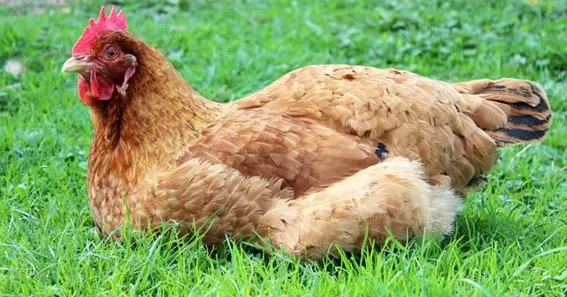Observing a chicken crouching down and not eating can be concerning for poultry keepers. These behaviors often indicate underlying health issues that require prompt attention. Understanding the potential causes and appropriate interventions is crucial to ensure the well-being of your flock.
Common Causes of Crouching and Loss of Appetite in Chickens
- Egg Binding
- Description: Occurs when an egg becomes stuck in the hen’s oviduct, preventing normal laying.
- Symptoms: Crouching posture, lethargy, loss of appetite, and straining without producing an egg.
- Intervention: Provide a warm, humid environment to relax the muscles. Gently massage the abdomen and consult a veterinarian if the egg isn’t passed within a few hours.
- Nutritional Deficiencies
- Description: Lack of essential nutrients can lead to weakness and abnormal postures.
- Symptoms: Lethargy, decreased appetite, weight loss, and poor feather quality.
- Intervention: Ensure a balanced diet rich in proteins, vitamins, and minerals. Supplement with poultry-specific vitamins if necessary.
- Parasitic Infestations
- Description: Internal parasites like worms can cause discomfort and reduce nutrient absorption.
- Symptoms: Crouching, weight loss, diarrhea, and decreased egg production.
- Intervention: Regular deworming and maintaining a clean living environment can help prevent infestations.
- Infections
- Description: Bacterial or viral infections can lead to systemic illness.
- Symptoms: Lethargy, loss of appetite, respiratory distress, and abnormal droppings.
- Intervention: Isolate the affected bird, consult a veterinarian for diagnosis, and administer appropriate treatments.
- Injury or Trauma
- Description: Physical injuries can cause pain, leading to reduced movement and appetite.
- Symptoms: Visible wounds, limping, or reluctance to move.
- Intervention: Examine for injuries, provide a safe and comfortable environment, and seek veterinary care if necessary.
Preventive Measures
- Regular Health Checks: Monitor your flock for early signs of illness or distress.
- Balanced Diet: Provide a nutritionally complete feed appropriate for the age and purpose of your chickens.
- Clean Environment: Maintain clean coops and runs to reduce the risk of infections and parasites.
- Access to Fresh Water: Ensure constant availability of clean, fresh water.
Conclusion
A chicken crouching down and not eating is a clear signal that something is amiss. By understanding the potential causes and implementing appropriate interventions, you can help restore your chicken’s health and maintain a thriving flock.
FAQ
- What should I do if my chicken is crouching and not eating?
- Isolate the affected chicken, assess for signs of illness or injury, and consult a veterinarian for a proper diagnosis.
- Can stress cause a chicken to stop eating?
- Yes, stress from environmental changes, predators, or social dynamics can lead to decreased appetite.
- How can I prevent egg binding in my hens?
- Ensure adequate calcium intake, provide a stress-free environment, and monitor for early signs of laying difficulties.
- What are common signs of parasitic infestations in chickens?
- Symptoms include weight loss, diarrhea, decreased egg production, and visible parasites in droppings.
- When should I seek veterinary care for my chicken?
- If your chicken shows persistent signs of illness, such as lethargy, loss of appetite, or abnormal behavior, consult a veterinarian promptly.
Check out here for a more interesting article can-felons-get-a-passport
- If your chicken shows persistent signs of illness, such as lethargy, loss of appetite, or abnormal behavior, consult a veterinarian promptly.










